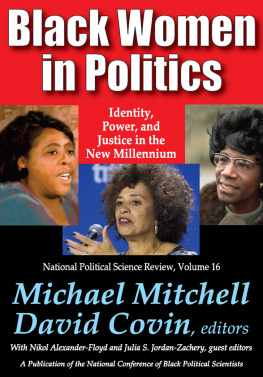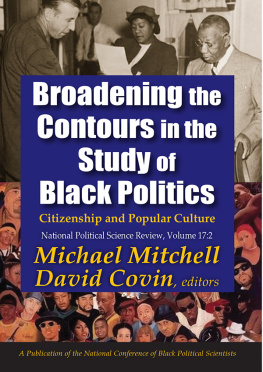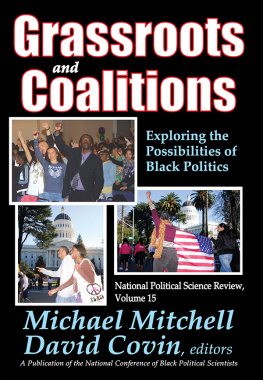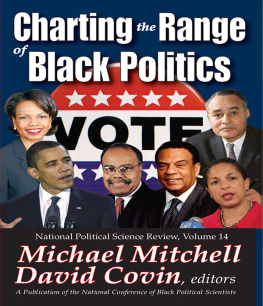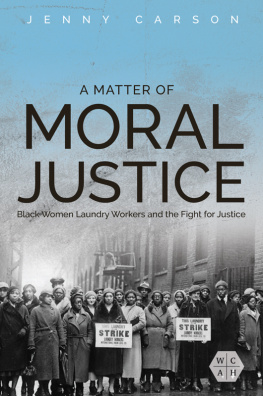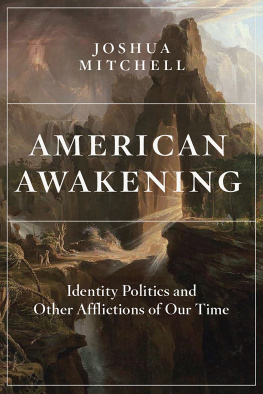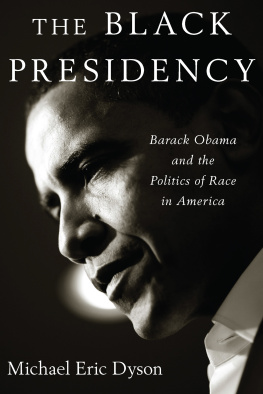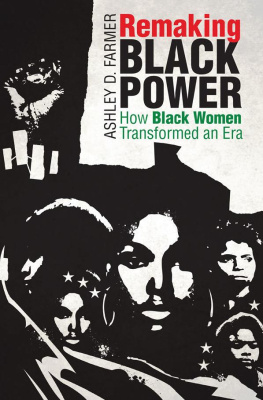Black Women in Politics
THE NATIONAL POLITICAL SCIENCE REVIEW
EDITORS
Michael Mitchell
Arizona State University
David Covin
California State University, Sacramento
VOLUME 16 GUEST EDITORS
Nikol Alexander-Floyd
Rutgers University, New Brunswick
Julia S. Jordan-Zachery
Providence College
BOOK REVIEW EDITOR
Tiffany Willoughby-Herard
University of California, Irvine
EDITORIAL BOARD
Georgia Persons
Georgia Institute of Technology
Duchess Harris
Macalester University
Lorenzo Morris
Howard University
K.C. Morrison
Mississippi State University
Lisa Aubrey
Arizona State University
Robert Smith
San Francisco State University
Cheryl M. Miller
University of Maryland-Baltimore County
Todd Shaw
University of South Carolina
Melissa Nobles
Massachusetts Institute of Technology
Black Women in Politics
Identity, Power, and Justice in the New Millennium
National Political Science Review, Volume 16
Michael Mitchell David Covin, editors
With Nikol Alexander-Floyd and Julia S. Jordan-Zachery, guest editors
A Publication of the National Conference of Black Political Scientists
First published 2014 by Transaction Publishers
Published 2017 by Routledge
2 Park Square, Milton Park, Abingdon, Oxon OX14 4RN
711 Third Avenue, New York, NY 10017, USA
Routledge is an imprint of the Taylor & Francis Group, an informa business
Copyright 2014 by Taylor & Francis.
All rights reserved. No part of this book may be reprinted or reproduced or utilised in any form or by any electronic, mechanical, or other means, now known or hereafter invented, including photocopying and recording, or in any information storage or retrieval system, without permission in writing from the publishers.
Notice:
Product or corporate names may be trademarks or registered trademarks, and are used only for identification and explanation without intent to infringe.
Library of Congress Catalog Number: 2014009852
Library of Congress Cataloging-in-Publication Data
Black women in politics : identity, power, and justice in the new millennium / Michael Mitchell and David Covin, editors ; with Nikol Alexander-Floyd and Julia Jordan-Zachery, guest editors.
pages cm
National Political Science Review Volume 16 (2014).
Includes bibliographical references.
ISBN 978-1-4128-5469-6
1. African American womenPolitical activity. 2. African American women politicians. 3. Women political scientistsUnited States. 4. African AmericansPolitics and government21st century. I. Mitchell, Michael, 1944- II. Covin, David, 1940-III. National political science review.
E185.86.B5424 2014
320.082dc23
2014009852
ISBN 13: 978-1-4128-5469-6 (pbk)
Contents
Nikol Alexander-Floyd
Julia S. Jordan-Zachery
Rosemary Ndubuizu
Julia S. Jordan-Zachery and Salida Wilson
Adryan Wallace
Nadia E. Brown
Ray Block Jr. and Christina S. Haynes
Stefanie Chambers and William E. Nelson, Jr.
Christina Rivers
B. DAndra Orey and Nadia E. Brown
Volume 16 of the National Political Science Review (NPSR) is a special issue devoted to Black women in politics. Under the leadership of our guest editors, Volume 16 contains a collection of well-researched and tightly argued articles that examine the political experiences of African descended women in the United States, the diaspora, and the African continent from Black feminist perspectives.
African American women have continuously played a decisive role in the struggle for justice and equality in America. This role stretches across the expanse of the Black political experience and includes such figures as Harriet Tubman, Ida B. Wells, Ella Baker, and Fannie Lou Hamer. In more contemporary times, African American women have continued the tradition of struggle as demonstrated by their institutional presence in American politics, serving as Members of Congress and in state legislatures. They have also made their way as elected officials and policy makers at all levels and as strategic voting constituencies in national elections. Their counterparts in Africa and throughout the diaspora have undertaken similar efforts. In other words, Black women have carved out a presence whose dynamism deserves close scrutiny and attention.
Notwithstanding their more visible roles in the conventional institutions of politics, Black women experience cross pressures that constrain their capacities to exercise power in a variety of domains. Our guest editors focus on this point. They have selected, through peer review, research articles that take as their starting point the concept of intersectionality. Intersectionality is examined throughout these articles in analyzing the cross pressures felt by African descended women as political agents in the domains of elections, public policy, and social activism. Their challenges and initiatives are explored in public spaces, institutional behaviors, and public policy. In the end, Volume 16 of the NPSR makes its contribution to the work of Black feminist scholars whose efforts have expanded our understanding about the dynamics of power in the study of politics writ large. We thank our guest editors, Nikol Alexander-Floyd of Rutgers University and Julia Jordan-Zachery of Providence College, in assembling this NPSR special issue on Black Women in Politics.
This volume also contains other works that complement the major articles in this issue. They include an essay on Black leadership, radical versus moderate, in the city of New Orleans and one on the contours of the Shelby v. Holder Supreme Court decision. The editors also introduce a new series comprising tabular representations on selected trends in Black politics. The book review section provides a lively and fully critical discussion on selected recent works related to Black women in politics.
This issue also notes the passing of two pioneers in the study of Black politics, namely William (Nick) Nelson and Hanes Walton, Jr.
In recent years, we have witnessed increased attention being paid to the concept of intersectionality in the social sciences. As conceived by Black women and other women of color, intersectionality, as an approach to politics and research, accounts for and addresses the mutually constitutive forces of race, class, and gender. Much of the research produced under the rubric of intersectionality, however, fails to take into account the extensive literature on the topic, particularly the research and theories produced by Black women or other women of color. Moreover, despite the new-found popularity of intersectionality, there is still a relative dearth of literature on Black women as political subjects and the role of gender in Black politics. Given the role that Black women play in politicsas voters, as social movement and community activists, as elected officials, and as subjects of public policy discourseit is imperative that we expend greater energy and attention on investigating Black political women. This special issue on Black women in politicsthe first to appear in any political science journalprovides a much-needed context for exploring recent developments in Black women in politics as a subfield of political science in its own right. It highlights three dimensionsidentity, power, and justicethat are foundational to intersectionality theory and politics as developed by Black women and other women of color.


